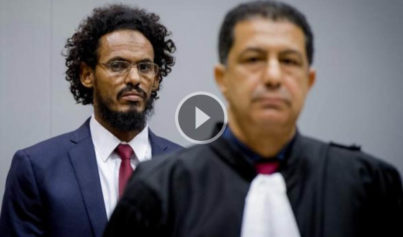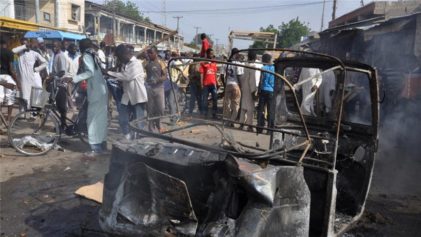Just a week after French President Francois Hollande received a hero’s welcome in Mali for his nation’s successful mission in rooting out Islamist rebels there, two separate events today in the West African country underscored the precarious nature of the operation. A suicide bomber attacked a military camp in Gao, and group of soldiers aligned with last year’s coup attacked the presidential guard in the capital city of Bamako.
In the suicide bombing in Gao, a city in north Mali, the only fatality was the bomber himself. He approached the checkpoint at the entrance to Gao at around 6 a.m., riding a motorcycle and wearing an explosive belt. He blew himself up before he reached the checkpoint — the first suicide bombing since the French moved into Mali on Jan. 11.
Visible at the scene were the charred, mangled remains of his bike and a splattering of blood. Malian soldiers who stood guard said local villagers had taken the man’s remains away and buried them before sunset, in accordance with local Muslim custom.
In Bamako, a unit of soldiers aligned with the coup that toppled former President Amadou Toumani Toure last March made a run at the camp of the presidential guard, where many military families live.
“Since 6 a.m., the soldiers arrived in armored cars and pickup trucks, all of them armed to the teeth to attack our base. The women and children tried to stop them from entering the camp. They shot tear gas at us and started shooting volleys in the air,” Batoma Dicko, a woman who lives in the military camp, told The Washington Post.
Both attacks highlighted how unstable the situation is in Mali — despite assurances by the French earlier this week that they would be able to withdraw their 4,000 troops by the end of March. They plan to leave the security of the nation to African forces.
A newspaper reported that Senegalese writer and intellectual Boubacar Boris Diop said that Hollande undertook the mission to boost his image in Paris — and also to position France to take control of the vast resources in the Sahara.
“This is the end of independence for Mali for a long time, and for its relative territorial homogeneity,” Diop said in the Senegalese newspaper, Le Pays au Quotidien. “It would be naive to imagine that, after having worked so hard to liberate the north, France will hand over the keys of the country to (interim President) Dioncounda Traore and to the Malians and be satisfied with effusive farewells. No, the world does not work that way. France has put itself in a good position in the race for the prodigious natural resources of the Sahara.”
Diop said the rest of Africa should be disturbed that the Malians were abandoned by the continent and had to rely on their former colonizers to save them, welcoming the troops by enthusiastically waving French flags.
“The question that these images really raise for us is, how is it that the French troops who occupied Mali for centuries as barbaric colonizers have come back 50 years later to be greeted as liberators? Does this not leave us seriously perplexed?” he asked.
Captain Samba Coulibaly, spokesman for the Mali military, said Malians shouldn’t be fearful that French ground troops are leaving.
“The departure of the French soldiers does not scare us, especially since their air force will still be present both in Timbuktu and Sevare,” he said. “They control this entire zone and can intervene within a matter of minutes in order to carry out air strikes as needed.”
Even after France withdraws from the cities in the south and central regions, French Foreign Minister Laurent Fabius said troops will continue operations to flush out militants in “some terrorist havens” in the north.
France wants to ensure that the Islamists can’t make future threats to France. Because of the nature of terrorism, even after the Islamists are routed in Mali, they only need small numbers to deliver significant damage there and beyond.
Last week, Hollande was welcomed as a conquering hero in the former French colony. On a whirlwind one-day tour, he was greeted by jubilant Malians everywhere. Malians danced to the beat of drums, which was banned by the Islamist rebels under Sharia law.
In the famed city of Timbuktu, where insurgents had destroyed historic mausoleums, Hollande saw sport shirts with the flags of both countries, and banners reading “Thank You France.” He was presented with the gift of a camel and waded into an adoring crowd in Timbuktu, accompanied by Fabius, Defense Minister Jean-Yves Le Drian and Development Minister Pascal Canfin.
“I have just lived through the most important day of my political life,” Hollande said to the cheering crowd waving the red, white and blue colors of France and holding portraits of the president.
In Bamako, Hollande told a crowd yesterday, “Terrorism was pushed back, chased, but it hasn’t yet been vanquished. France will stay with you as long as it takes, until the time for Africans themselves to replace us. Until then, we will be beside you to the end, as far as north Mali.”
Hollande said his country would support the Malian economy and help with reconstruction of public services, education, health, security and cultural heritage.


